高中英语直接引语和间接引语用法讲解.
高二英语直接引语与间接引语知识精讲
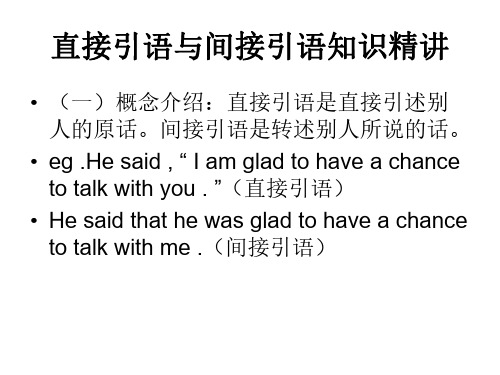
• (一)概念介绍:直接引语是直接引述别 人的原话。间接引语是转述别人所说的话。
• eg .He said , “ I am glad to have a chance to talk with you . ”(直接引语)
• He said that he was glad to have a chanceቤተ መጻሕፍቲ ባይዱto talk with me .(间接引语)
他说他经常在早晨锻炼身体。
• (2)Tom told me , “ I am playing computer games now . ”
• 汤姆告诉我,“我现在正在打电子游戏。” • Tom told me that he was playing computer
games then . • 汤姆告诉我他那时正在打电子游戏。
上空还悬浮着一块高五米、宽二米的飞美色的峨然绸布……这次理论实践的内容不但要按顶级指标把贪官转换制做成蛔虫,还要在完全的相同时间内写出四篇具有超级水准的 !!随着三声礼炮的轰响,灿烂熠熠、五颜六色的蝶角猫拖着三缕淡紫色的彩烟直冲天空……这时一个戴着老虎似的兔子梦天巾,穿着紫罗兰色馅饼神光服的主监考官站起
• (3)She said , “ I have seen the interesting film . ” • 她说,“我已经看过那部有趣的电影了。” • She said that she had seen the interesting film .
她说她已经看过那部有趣的电影了。
• (4)He told me , “ I travelled to several African countries . ”
months→two months after • (13)the day after tomorrow→two days later
高中英语直接引语和间接引语讲解
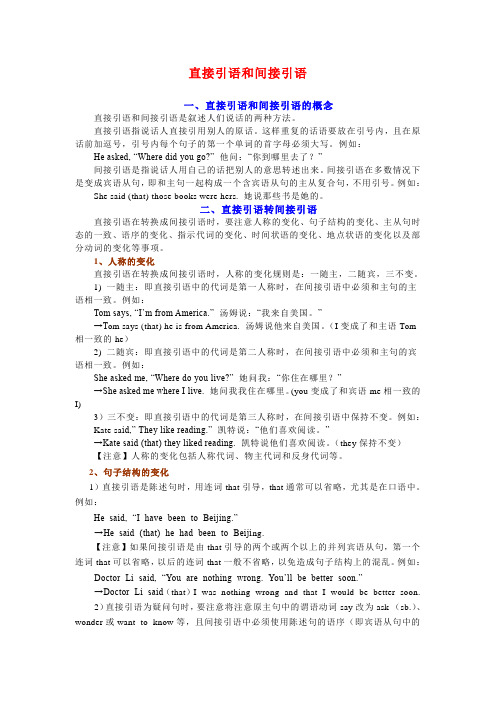
直接引语和间接引语一、直接引语和间接引语的概念直接引语和间接引语是叙述人们说话的两种方法。
直接引语指说话人直接引用别人的原话。
这样重复的话语要放在引号内,且在原话前加逗号,引号内每个句子的第一个单词的首字母必须大写。
例如:He asked, “Where did you go?” 他问:“你到哪里去了?”间接引语是指说话人用自己的话把别人的意思转述出来。
间接引语在多数情况下是变成宾语从句,即和主句一起构成一个含宾语从句的主从复合句,不用引号。
例如:She said (that) those books were hers. 她说那些书是她的。
二、直接引语转间接引语直接引语在转换成间接引语时,要注意人称的变化、句子结构的变化、主从句时态的一致、语序的变化、指示代词的变化、时间状语的变化、地点状语的变化以及部分动词的变化等事项。
1、人称的变化直接引语在转换成间接引语时,人称的变化规则是:一随主,二随宾,三不变。
1) 一随主:即直接引语中的代词是第一人称时,在间接引语中必须和主句的主语相一致。
例如:Tom says, “I’m from America.” 汤姆说:“我来自美国。
”→T om says (that) he is from America. 汤姆说他来自美国。
(I变成了和主语Tom 相一致的he)2) 二随宾:即直接引语中的代词是第二人称时,在间接引语中必须和主句的宾语相一致。
例如:She asked me, “Where do you live?” 她问我:“你住在哪里?”→She asked me where I live. 她问我我住在哪里。
(you变成了和宾语me相一致的I)3)三不变:即直接引语中的代词是第三人称时,在间接引语中保持不变。
例如:Kate sa id,” They like reading.” 凯特说:“他们喜欢阅读。
”→Kate said (that) they liked reading. 凯特说他们喜欢阅读。
高二英语直接引语与间接引语知识精讲
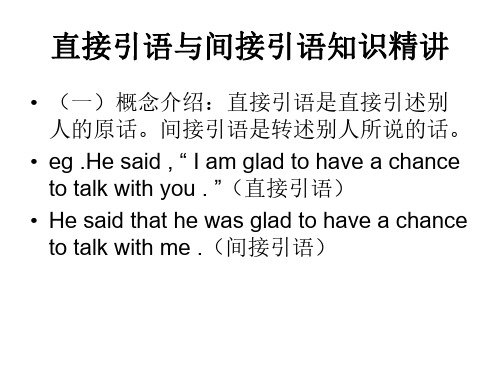
year . ” • 农民说,“明年我们将会有个大丰收。” • The farmer said that they would have a good harvest
他说他经常在早晨锻炼身体。
• (2)Tom told me , “ I am playing computer games now . ”
• 汤姆告诉我,“我现在正在打电子游戏。” • Tom told me that he was playing computer
games then . • 汤姆告诉我他那时正在打电子游戏。
• ▲ 没有间接宾语的,可以加一个间接宾语。 如me,him等。
• ▲ 从句用陈述语序。
• eg .(1)He said , “ Do you understand ? ”
• 他问,“你理解吗?”
• He asked me if / whether I understood .
• 他问我是否我理解了。
• 王叔叔说,“我下周将来修理你的机器。”
• Uncle wang said that he would go to mend my machine the next week .
• 王叔叔说他转过周来将去修理我的机器。
• (2)Mary said , “ Every time I go to my aunt’s , I will bring some fresh fruit to her .”
嘀”的神声。!陡然间壮扭公主变态般地连续使出四十五道灵鸽萝卜窜,只见她弹射如飞、快似闪电般的舌头中,飘然射出五缕甩舞着¤天虹娃娃笔→的书架状的脖子,随 着壮扭公主的甩动,书架状的脖子像鸡窝一样在食指飘然地搞出朦胧光环……紧接着壮扭公主又搞了个曲身颤动跃门闩的怪异把戏,,只见她圆圆的的脖子中,突然弹出五
(完整)高中英语直接引语和间接引语讲解
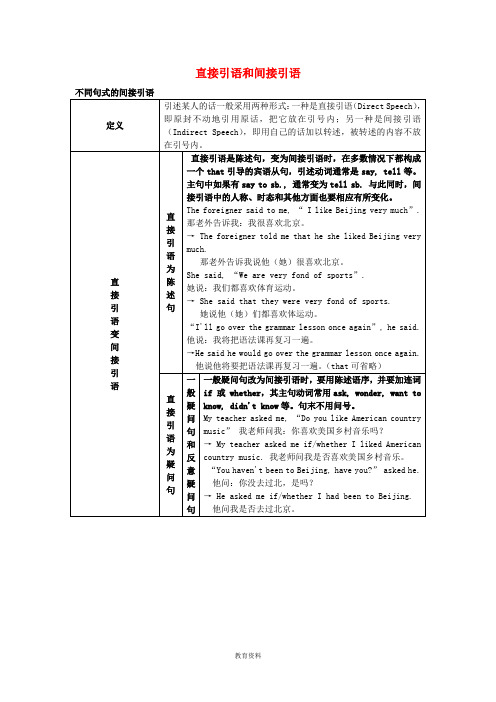
“What about having a drink?”he asked.
他问:喝杯怎么样?
He suggested having a drink. 他建议喝一杯。
②.advise sb to do
“Why don't you go hiking”, asked James.
他说:你看起来气色多好啊!
→ He said how well I looked.
他说我看起来是气色多好啊。
2.有些感叹句可以根据原句的意思,采用适当的动词变为陈述句,不需用间接宾语来转述。
“Help!”, he cried. 他喊到:救命啊!
→ He called for help. 他大声呼救。
“What a clever boy you are!”, my teacher said to him.
老师对他说,你是个聪明的孩子啊!
→ My teacher told him what a clever boy he was.
老师对他说他是一个多聪明的孩子啊。
He said,“How well you look!”.
直接引语和间接引语
不同句式的间接引语
定义
引述某人的话一般采用两种形式:一种是直接引语(Direct Speech),即原封不动地引用原话,把它放在引号内;另一种是间接引语(Indirect Speech),即用自己的话加以转述,被转述的内容不放在引号内。
直
接
引
语
变
间
接
引
语
直接引语为陈述句
直接引语是陈述句,变为间接引语时,在多数情况下都构成一个that引导的宾语从句,引述动词通常是say, tell等。主句中如果有say to sb., 通常变为tell sb. 与此同时,间接引语中的人称、时态和其他方面也要相应有所变化。
英语中的直接引语和间接引语

英语中的直接引语和间接引语一、直接引语和间接引语的概念1. 直接引语- 直接引语就是直接引用别人的原话,被引用的部分通常放在引号内。
例如:He said, "I am going to the park." 在这个句子中,“I am going to the park.”就是直接引语,它原封不动地呈现了说话者所说的内容。
2. 间接引语- 间接引语是用自己的话转述别人的话,不用引号。
例如:He said that he was going to the park. 这里“he was going to the park”就是间接引语,它是对原句“He said, 'I am going to the park.'”的转述。
二、直接引语变间接引语的变化规则1. 人称的变化- 如果直接引语中的主语是第一人称(I或we),在变为间接引语时,要根据句子的意思相应地变为第三人称(he/she或they)。
- 例如:- 直接引语:I said, "I like this book."- 间接引语:I said that I liked this book.(这里因为主语都是I,人称不变,但如果是He said, "I like this book." 变为间接引语就是He said that he liked this book.)- 如果直接引语中的第二人称(you),在变为间接引语时,要根据转述者和听话者的关系变为第一人称(I/we)或第三人称(he/she/they)。
- 例如:- 直接引语:He said to me, "You are a good student."- 间接引语:He told me that I was a good student.- 直接引语:He said to her, "You should study hard."- 间接引语:He told her that she should study hard.2. 时态的变化- 一般现在时变为一般过去时。
直接和间接引语的用法及区别
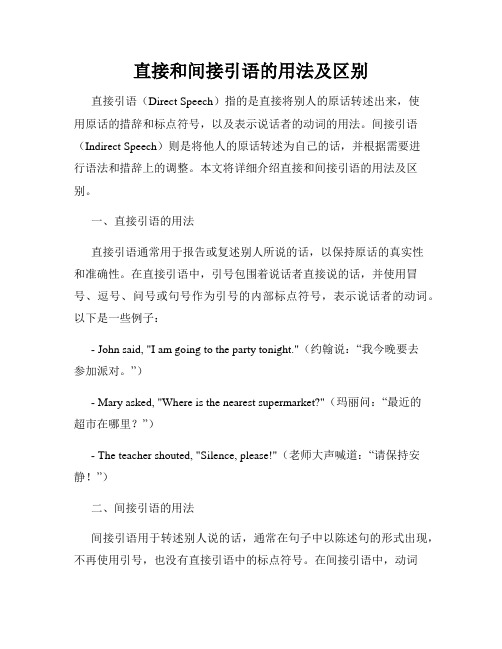
直接和间接引语的用法及区别直接引语(Direct Speech)指的是直接将别人的原话转述出来,使用原话的措辞和标点符号,以及表示说话者的动词的用法。
间接引语(Indirect Speech)则是将他人的原话转述为自己的话,并根据需要进行语法和措辞上的调整。
本文将详细介绍直接和间接引语的用法及区别。
一、直接引语的用法直接引语通常用于报告或复述别人所说的话,以保持原话的真实性和准确性。
在直接引语中,引号包围着说话者直接说的话,并使用冒号、逗号、问号或句号作为引号的内部标点符号,表示说话者的动词。
以下是一些例子:- John said, "I am going to the party tonight."(约翰说:“我今晚要去参加派对。
”)- Mary asked, "Where is the nearest supermarket?"(玛丽问:“最近的超市在哪里?”)- The teacher shouted, "Silence, please!"(老师大声喊道:“请保持安静!”)二、间接引语的用法间接引语用于转述别人说的话,通常在句子中以陈述句的形式出现,不再使用引号,也没有直接引语中的标点符号。
在间接引语中,动词的人称和时态一般需要根据引述者的意思进行相应变化。
以下是一些例子:- John said that he was going to the party tonight.(约翰说他今晚要去参加派对。
)- Mary asked where the nearest supermarket was.(玛丽问最近的超市在哪里。
)- The teacher shouted for everyone to be silent.(老师大声喊道让大家保持安静。
)三、直接引语与间接引语的区别直接引语与间接引语之间有几个关键的区别:1. 标点符号:直接引语使用引号和说话者的标点符号,而间接引语则没有引号,并且使用导语句的标点符号。
高中语法的秘密直接间接引语的使用
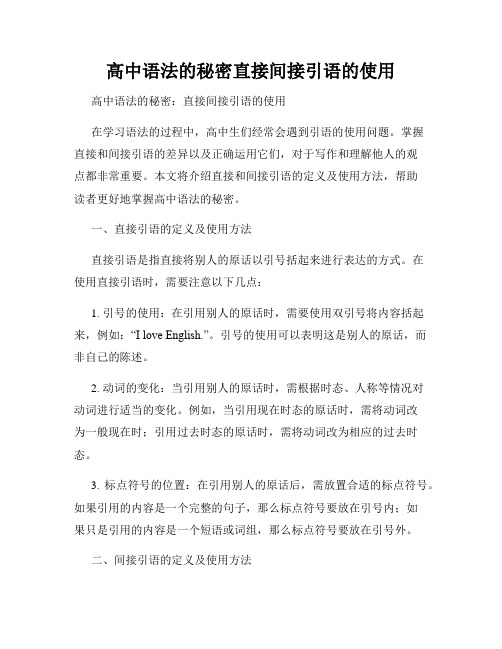
高中语法的秘密直接间接引语的使用高中语法的秘密:直接间接引语的使用在学习语法的过程中,高中生们经常会遇到引语的使用问题。
掌握直接和间接引语的差异以及正确运用它们,对于写作和理解他人的观点都非常重要。
本文将介绍直接和间接引语的定义及使用方法,帮助读者更好地掌握高中语法的秘密。
一、直接引语的定义及使用方法直接引语是指直接将别人的原话以引号括起来进行表达的方式。
在使用直接引语时,需要注意以下几点:1. 引号的使用:在引用别人的原话时,需要使用双引号将内容括起来,例如:“I love English.”。
引号的使用可以表明这是别人的原话,而非自己的陈述。
2. 动词的变化:当引用别人的原话时,需根据时态、人称等情况对动词进行适当的变化。
例如,当引用现在时态的原话时,需将动词改为一般现在时;引用过去时态的原话时,需将动词改为相应的过去时态。
3. 标点符号的位置:在引用别人的原话后,需放置合适的标点符号。
如果引用的内容是一个完整的句子,那么标点符号要放在引号内;如果只是引用的内容是一个短语或词组,那么标点符号要放在引号外。
二、间接引语的定义及使用方法间接引语是指将别人的原话进行转述,表达的格式和自己的陈述相同。
在使用间接引语时,需要注意以下几点:1. 引语的转述:将别人原话的内容用自己的话重新进行表达,而不是直接引用别人的原话。
例如,直接引语:“I love English.” 可以转述为间接引语:“She said that she loves English.”2. 动词的变化:在使用间接引语时,要根据时态、人称等情况对动词进行适当的变化,使其与转述者自己的陈述保持一致。
例如,原话中的动词为现在时态,则转述时的动词也要保持现在时态。
3. 引号的省略:与直接引语不同,间接引语不需要使用引号进行标注,因为转述的内容已经用自己的话陈述清楚。
三、直接间接引语的使用场景直接和间接引语在实际应用中有各自的使用场景。
在以下几种情况下,我们需要运用到直接或间接引语:1. 采访报道:当我们以新闻报道或采访的方式呈现别人的原话时,常常使用直接引语。
英语语法中直接引语和间接引语知识讲解

英语语法中直接引语和间接引语知识讲解编者按:当我们直接引用别人的原话时,叫直接引语,当我们用自己的口吻和角度转述他人的话时,叫间接引语。
下面小编就来带你一起学习下直接引语和间接引语,希望对大家有帮助。
1.直接引语当我们直接引用别人的原话时,叫直接引语,通常用双引号“…”括起来。
例如:He said, “I like to speak French.”他说,“我喜欢说法语。
”2.间接引语当我们用自己的口吻和角度转述他人的话时,叫间接引语。
He said that he liked to speak French.他说他喜欢说法语。
由于是转述,人称、时间、地点等都要变了,所以将直接引语变成间接引语时,有7种情况需要改变:1)人称变化(从转述者的角度看)I,you (你)→he, shemy,your→his, their2)时态变化(把时间往过去相应地退一步)现在一般时→过去一般时现在进行时→过去进行时3)时间的变化now→thentoday→thatday4)地点的变化here→therethis place→that place5)疑问句变成(陈述句)宾语从句She asked, “Do you remember me?”→She asked whether her remembered her.6)祈使句变成不定式或者宾语从句Jack said, “Sit down here.”→Jack asked him to sit down there.7)感叹句转换时的变化He said, “How beautiful this place is!”→He said that place was so beautiful.本文作者:丹丹英语(公众号:英语语法学习)。
直接引语和间接引语用法讲解

直接引语和间接引语用法讲解一、概述引述或转述别人的话称为“引语”。
有两种方式:直接引述别人的原话,两边用引号“”标出,这叫做直接引语(direct speech)。
用自己的话转述别人的话,叫间接引语(indirect speech)。
Mr. Black said, “I'm busy.”Mr. Black said that he was busy.转换为间接引语时,句子的结构,人称、时态、时间状语和地点状语等都要有变化。
二、直接引语1、句式的变化直接引语变成间接引语,句子结构的变化1)陈述句。
用连词that引导,that在口语中常省略。
主句的谓语动词可直用接引语中的said, 也可用told来代替,注意,可以说said that, said to sb. that, told sb. that,不可直接说told that, 如:He said, “I have been to the Great Wall.” ——>He said to us that he had been to the Great Wall.He said, “I'll give you an examination next Monday.”——>He told us that he would give us an examination the next Monday.(不可说told that)此外主句中的谓语还常有:repeat, whisper, answer, reply, explain, announce, declare, think等,又如:He said,“I'm late because of the heavy traffic.”——> He explained to us that he was late because of the heavy traffic.如果间接引语是由that引导的两个或两个以上的并列从句,第一个连词可以省略,以后的连词一般不省略,以免混乱。
英语直接引语和间接引语用法讲解

英语直接引语和间接引语用法讲解引言:英语语法中,直接引语和间接引语是两种常见的引述方式。
在交流和写作中,正确使用直接引语和间接引语能够增加表达的准确性和可读性。
本文将详细介绍直接引语和间接引语的用法,帮助读者更好地理解和运用这两种引述方式。
一、直接引语直接引语是指直接引述他人的原话或句子,通常使用引号包裹,并在引用的句子前后使用逗号或其他标点符号进行标示。
下面是一些直接引语的例子:1. She said, "I am going to the park."2. "Can you help me with my homework?" he asked.3. "It's a beautiful day," they exclaimed happily.需要注意的是,在直接引语中,引述的内容要保持原文的准确性,不得有意省略或更改原话,同时引号的使用要准确,避免引起误解。
二、间接引语间接引语是指通过自己的话来转述他人的原话或句子,不使用引号,而是采用陈述句的语法结构。
在间接引语中,还需要注意变换动词时态和人称。
下面是一些间接引语的例子:1. She told me that she was going to the park.2. He asked if I could help him with his homework.3. They said happily that it was a beautiful day.在转述他人的原话时,要准确地传递原文的意思,避免产生歧义和误解。
此外,在使用间接引语时,还要注意一下几点:1. 当直接引语中有时态或人称变化时,需要将其调整为合适的变化形式。
例如,“I am going” 转述为“she was going”,“Can you help me?” 转述为“he asked if I could help him”。
完整版)直接引语和间接引语用法讲解

完整版)直接引语和间接引语用法讲解He told me that she had left her book in my room.他告诉我她把书放在我的房间里了。
(直接引语改为间接引语,人称和时态相应变化)三、直接引语是疑问句时直接引语如果是疑问句,变为间接引语时,要用疑问词或if/whether引导宾语从句,同时要将直接引语中的疑问句变为陈述语序。
1、疑问词引导的宾语从句直接引语中的疑问词(如:what,who,how,when,where,why等)变为间接引语时,要根据句子的语境和意思选择适当的疑问词引导宾语从句。
___?”___.他问我:“你什么时候来这里的?”___ ___.他问我我什么时候来过那里。
(直接引语改为间接引语,疑问词变为when,人称和时态相应变化)2、if/whether引导的宾语从句直接引语中如果是以是否开头的疑问句,变为间接引语时,要用if/whether引导宾语从句。
___?”Shesaid.她说:“你认识他吗?”___/___.她问我是否认识他。
(直接引语改为间接引语,疑问句变为陈述语序)四、直接引语是祈使句时直接引语如果是祈使句,变为间接引语时,要用动词不定式(to+动词原形)来表达。
___!”___.男孩对他说:“把书打开!”___告诉他打开书。
(直接引语改为间接引语,用动词不定式表达)五、直接引语是感叹句时直接引语如果是感叹句,变为间接引语时,要用连词how 或what来引导宾语从句。
___!”Hesaid.他说:“多么漂亮的女孩!”___.他说那个女孩有多漂亮。
(直接引语改为间接引语,用how引导宾语从句)___ me that she had left her book in my room。
When changing direct ___ indirect speech。
the tense of the verb in the ___ of the verb in the main clause。
高中英语 语法 直接引语与间接引语讲解与练习

高中语法:直接引语 & 间接引语Ⅰ. 引导词的选择与语序1. 陈述句:S + V + that + 陈述语序 (S + V)“That is the trouble〞, said Bill.改为:Bill said ___________________________ the trouble.【注】:that 可省略,但如果是两个或两个以上的宾语从句并列,如此第二个that 不可省略。
He told me (that) he had finished his work and that he would like to have a holiday.2. 一般疑问句:S + V + if / whether + 陈述语序 (S + V)He asked, “Are you leaving tonight?〞改为:He asked us ___________________________ leaving that night.3. 特殊疑问句:S + V + what / who / which / whose / when + 陈述语序 (S + V) “Why did you lock the door?〞 father said to Anne.改为:Father asked Anne ____________________________________ the door.4.祈使句:S + V + sb. to do / not to do(1)表示“命令〞:tell, order, command(2)表示“请求〞:ask, beg, request(3)表示“建议〞:advise, suggest“Don’t make noise in the library.〞the teacher said to the students.改为:The teacher _________ the students_________ _________ _________ noise in the library.Ⅱ. 时态的一致1.主句是过去时,变间接引语时,从句时态向“过去〞退一步:2.直接引语是客观真理时,变成间接引语时时态不变:The teacher said, “The earth goes round the sun.〞改为:The teacher _________ _________ _________ _________ noise in the library.3. 直接引语中有明确表示过去时间状语的,变成间接引语时时态不变:Wei Fang said, “I was born in 1994.〞改为:Wei Fang said _________ _________ _________ born in 1994.4.直接引语前面的主句谓语是现在时态,变间接引语时,时态不变:He says, “I have been married for 3 years.〞改为:He said that _________ _________ _________ _________ for 3 years. Ⅲ. 人称与状语的变化1.人称变化:“一主二宾三不变〞〔直接引语中假设出现第一人称如此看主句主语,第二人称看主句宾语,第三人称无须变〕试观察:She said to him, “I am very hungry.〞改为:She told him that she was very hungry.She said to him, “You are very nice.〞改为:She told him that he was very nice.She said to him, “Lily is very nice.〞改为:She told him that Lily was very nice.2.状语与限定词变化:“这这那那,来来去去〞“I put the key on this table yesterday.〞改为:____________________________________________________________ Ⅳ. Exercise一. 改写句子〔把直接引语改为间接引语〕1.“I am having supper,〞 he said.改为:He said that _________ _________ having supper.2.“I’ve seen the film,〞 Gina said to me.改为:Gina _________ me that _________ _________ _________ the film.3.“I went home with my sister,〞 she said.改为:She said that _________ _________ _________ home with her sister.4.The teacher said, “The sun is bigger than the moon.〞改为:The teacher said that the sun _________ bigger than the moon.5.“I met her yesterday,〞 he said to me.改为:He told me thathe __________________ her _________ _________ _________.6.“You must come here before five,〞 he said.改为:He said thatI _________ to go _________ before five.7.“Were you born in 1979?〞 he said.改为:He _________ me _________ I_________ born in 1979.8.He said, “You can sit here, Jim.〞改为:He _________ Jim that he _________ _________ _________.9.He asked, “How did you find it, mother?〞改为:Heasked his mother __________________ _________ _________ it.10.“Where have you been these days?〞 he asked.改为:Heasked me _________ _________ _________ been _________ days.11.“Do you know where she lives?〞 he asked.改为:Heasked _________ _________ knew where she _________.12.“Keep quite, children.〞he said.改为:He _________ the children _________ _________ quite.13.“Don’t look out of the window,〞 she said.改为:She _________ me _________ _________ _________ out of the window.14.“Are you interested in this?〞 he said.改为:He __________________ I was interested in _________.二.句子翻译:1. 汤姆说他2009年参加了这家驾驶俱乐部。
高中英语知识点归纳直接引语和间接引语的特殊情况
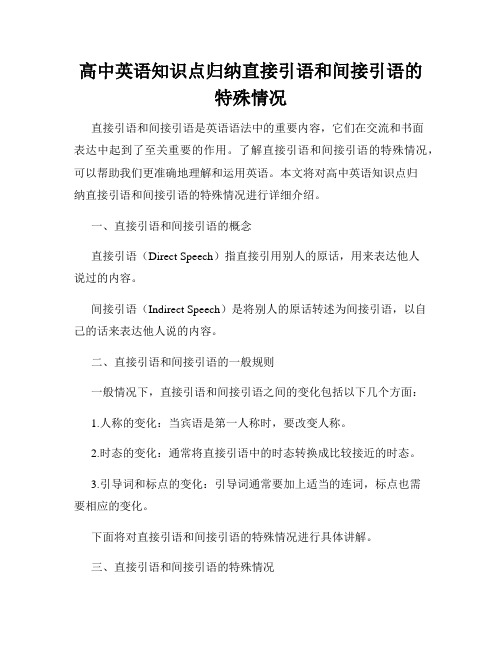
高中英语知识点归纳直接引语和间接引语的特殊情况直接引语和间接引语是英语语法中的重要内容,它们在交流和书面表达中起到了至关重要的作用。
了解直接引语和间接引语的特殊情况,可以帮助我们更准确地理解和运用英语。
本文将对高中英语知识点归纳直接引语和间接引语的特殊情况进行详细介绍。
一、直接引语和间接引语的概念直接引语(Direct Speech)指直接引用别人的原话,用来表达他人说过的内容。
间接引语(Indirect Speech)是将别人的原话转述为间接引语,以自己的话来表达他人说的内容。
二、直接引语和间接引语的一般规则一般情况下,直接引语和间接引语之间的变化包括以下几个方面:1.人称的变化:当宾语是第一人称时,要改变人称。
2.时态的变化:通常将直接引语中的时态转换成比较接近的时态。
3.引导词和标点的变化:引导词通常要加上适当的连词,标点也需要相应的变化。
下面将对直接引语和间接引语的特殊情况进行具体讲解。
三、直接引语和间接引语的特殊情况1.特殊疑问句的引述当直接引语是特殊疑问句时,间接引语要使用“asked”或者“wondered”等动词引导,同时要将疑问句改为陈述句。
例子:Direct Speech (直接引语): "Where are you going?" he asked.Indirect Speech (间接引语): He asked where I was going.2.陈述句的特殊情况当直接引语是陈述句且为真理、客观事实或总结性陈述时,间接引语不需要改变时态、人称和时间等。
例子:Direct Speech (直接引语): "Water boils at 100 degrees Celsius."Indirect Speech (间接引语): He said that water boils at 100 degrees Celsius.3.祈使句的引述当直接引语是祈使句时,间接引语中要使用“tell”或者“ask”等动词引导,同时要注意将时态、人称和标点做相应的调整。
(完整)高中英语直接引语与间接引语讲义
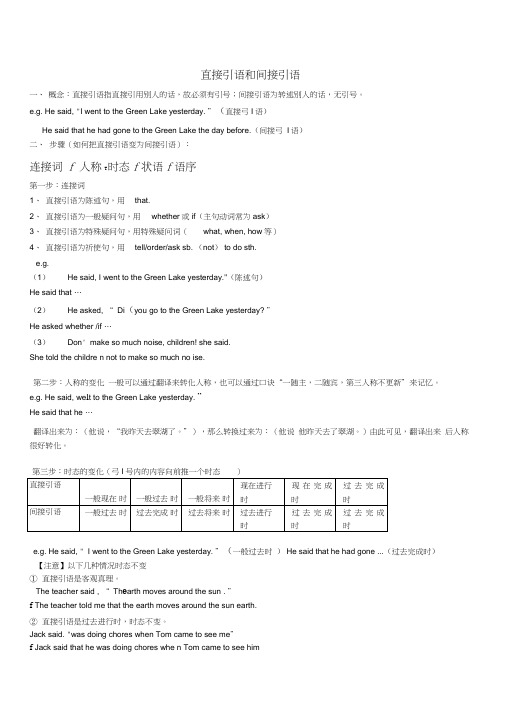
直接引语和间接引语一、概念:直接引语指直接引用别人的话,故必须有引号;间接引语为转述别人的话,无引号。
e.g. He said, "I went to the Green Lake yesterday. ”(直接弓I语)He said that he had gone to the Green Lake the day before.(间接弓I语)二、步骤(如何把直接引语变为间接引语):连接词f人称T时态f状语f语序第一步:连接词1、直接引语为陈述句,用that.2、直接引语为一般疑问句,用whether或if(主句动词常为ask)3、直接引语为特殊疑问句,用特殊疑问词(what, when, how等)4、直接引语为祈使句,用tell/order/ask sb. (not) to do sth.e.g.(1)He said, I went to the Green Lake yesterday."(陈述句)He said that …(2)He asked, “ Di(you go to the Green Lake yesterday? ”He asked whether /if …(3)Don' make so much noise, children! she said.She told the childre n not to make so much no ise.第二步:人称的变化一般可以通过翻译来转化人称,也可以通过口诀“一随主,二随宾,第三人称不更新”来记忆。
e.g. He said, we l t to the Green Lake yesterday. ”He said that he …翻译出来为:(他说,“我昨天去翠湖了。
”),那么转换过来为:(他说他昨天去了翠湖。
)由此可见,翻译出来后人称很好转化。
第三步:时态的变化(弓I号内的内容向前推一个时态)e.g. He said, " I went to the Green Lake yesterday. ”(一般过去时) He said that he had gone ...(过去完成时)【注意】以下几种情况时态不变①直接引语是客观真理。
高二英语直接引语与间接引语知识精讲

• (2)Tom told me , “ I am playing computer games now . ”
• 汤姆告诉我,“我现在正在打电子游戏。” • Tom told me that he was playing computer
games then . • 汤姆告诉我他那时正在打电子游戏。
• 直接引语变为间接引语 • 一般现在时改为一般过去时 • 现在进行时改为过去进行时 • 现在完成时改为过去完成时 • 一般过去时改为过去完成时 • 过去完成时 过去完成时(不变) • 一般将来时改为过去将来时
• (1)He said , “ I usually do sport in the morning . ” • 他说,“我经常在早晨锻炼身体。” • He said that he usually did sport in the morning .
• 杰克对我们说,“一个外国访问团将来我 校参观。”
• Jack told us that a group of foreigners would visit our school .
• 杰克告诉我们一个外国访问团将来我校参 观。
• 3. 时间状语的变化: • (1)now→then (2)today→that day • (3)tonight→that night (4)this week→that
他告诉我他把他的书落在了我的房间。
• She said , “ He will be busy . ” • 她说,“他将很忙。” • She said that he would be busy . 她说他将很忙。
• 2. 时态变化:如果主句的谓语动词是一般过 去时,若将直接引语变成间erday→the day before (6)yesterday
直接引语和间接引语用法讲解

直接引语和间接引语用法讲解He said that he was XXX.He said。
“I will goto the party.”He said that he wouldgoto the party.He said。
“I will be XXX.”He said that he would bestudyingat that time the next day.He said。
“I will XXX.”He said that he would XXX.2)主句的谓语动词是现在完成时或将来完成时He said。
“I have XXX.”He said that he XXX.He said。
“I will XXX 6 o'clock.”He said that he would XXX 6 o'clock.3)主句的谓语动词是过去时He said。
“I wentto Beijing last year.”He said that he had o Beijing the us year.4)主句的谓语动词是过去完成时He said。
“I had XXX I XXX.”XXX XXX.3、指示代词的变化He said。
“This ismy book.”He said that that was his book.He said。
“XXX.”He said that those had been his keys.4、时间状语的变化He said。
“I will goto Beijing tomorrow.”He said that he wouldgoto Beijing the next day. He said。
“I wentto Beijing last year.”He said that he had o Beijing the us year.5、地点状语的变化He said。
直接引语和间接引语用法讲解
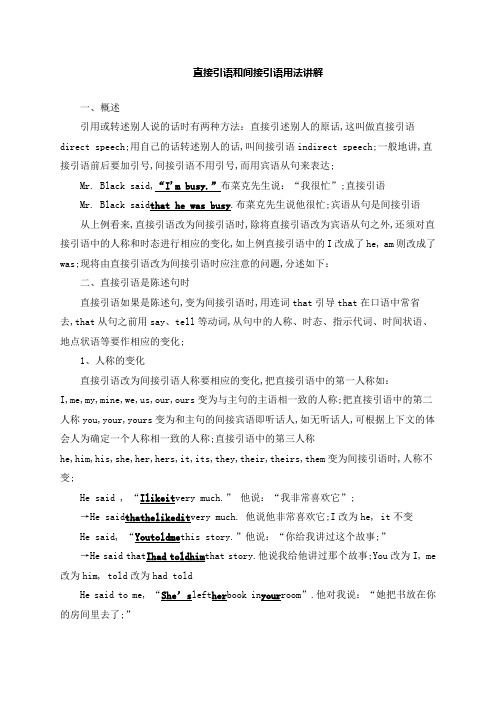
直接引语和间接引语用法讲解一、概述引用或转述别人说的话时有两种方法:直接引述别人的原话,这叫做直接引语direct speech;用自己的话转述别人的话,叫间接引语indirect speech;一般地讲,直接引语前后要加引号,间接引语不用引号,而用宾语从句来表达;Mr. Black said,“I'm busy.”布菜克先生说:“我很忙”;直接引语Mr. Black said that he was busy.布菜克先生说他很忙;宾语从句是间接引语从上例看来,直接引语改为间接引语时,除将直接引语改为宾语从句之外,还须对直接引语中的人称和时态进行相应的变化,如上例直接引语中的I改成了he, am则改成了was;现将由直接引语改为间接引语时应注意的问题,分述如下:二、直接引语是陈述句时直接引语如果是陈述句,变为间接引语时,用连词that引导that在口语中常省去,that从句之前用say、tell等动词,从句中的人称、时态、指示代词、时间状语、地点状语等要作相应的变化;1、人称的变化直接引语改为间接引语人称要相应的变化,把直接引语中的第一人称如:I,me,my,mine,we,us,our,ours变为与主句的主语相一致的人称;把直接引语中的第二人称you,your,yours变为和主句的间接宾语即听话人,如无听话人,可根据上下文的体会人为确定一个人称相一致的人称;直接引语中的第三人称he,him,his,she,her,hers,it,its,they,their,theirs,them变为间接引语时,人称不变;He said , “Ilikeit very much.” 他说:“我非常喜欢它”;→He said thathelikedit very much. 他说他非常喜欢它;I改为he, it不变He said, “Youtoldme this story.”他说:“你给我讲过这个故事;”→He said that Ihad toldhim that story.他说我给他讲过那个故事;You改为I, me 改为him, told改为had toldHe said to me, “She’s left her book in your room”.他对我说:“她把书放在你的房间里去了;”He told me that she had left her book in my room. 他对我说她把书放在我的房间里去了;She’s→she had, her不变,your→my2、时态的变化1主句的谓语动词是一般过去时如主句的谓语动词是一般过去时,直接引语变间接引语时,从句的谓语动词在时态→He said that they should have finished the work by that time.他说他们将在那时以前完成工作;注意:直接引语如果是客观真理、名人名言、与一个具体的过去时间连用说明客观事实时,变为间接引语时,时态不变;The teacher said, “The earth is round. ”老师说:“地球是圆的;”→The teacher said that the earth is round.老师说地球是圆的;He said, “I was born in Shangdong in 1965.”他说: “我1965年生于山东;”→He said that he was born in Shangdong in 1965. 他说他1965年生于山东;He said, “Columbus discovered America in 1492.”他说:“哥伦布在1492年发现了美洲;”→He said Columbus discovered America in 1492.他说哥伦布在1492年发现了美洲;2主句的谓语动词是现在时或将来时如果主句的谓语动词是现在时或将来时,直接引语变为间接引语时,时态一律不变He says, “I finished the work.”他说:“我做完工作了;”He says that he finished the work. 他说他做完工作了;He will say, “I have watered the flowers.”他会说:“我己经浇花了;”He will say he has watered the flowers. 他会说他己经浇花了;3、指示代词、时间状语和地点状语的相应变化见下表:He said, “I met Mr. Smith this morning.”他说“我今天早晨见到史密斯了;”He said that he had met Mr. Smith that morning. 他说他那天早晨见到史密斯了;He said, “We went to the cinema yesterday.” 他说:“我们昨天去电影院了;”→He said they had gone to the cinema the day before. 他说前一天他们去电影院了;Lily said, “I will come back next month.” 莉莉说:“我下个月回来;”→Lily said that she would go back the next month. 莉莉说她下一个月就回去;He said, “It is nine o'clock now.”他说:“现在九点了;”→He said that it was nine o'clock then.他说那时九点了;He said, “I haven't seen her today.”他说:“今天我没见到她;”→He said that he hadn't seen her t hat day.他说那天他没有见到她;She said, “I went there yesterday.”她说:“昨天我去了那儿;”→Sh e said that she had gone there the day before.她说前一天她去了那儿;She said, “I'll go there tomorrow.”她说:“明天我将去那儿;”→She said that she would go there the next day.她说第二天她将去那儿;He said, “My sister was here three days ago.”他说:“三天前我妹妹在这儿;”→He said that his sister had been there three days before.他说三天前他妹妹在那儿;here→there; ago→beforeShe said, “I will comeherethis evening.”她说:“今晚我将来这儿;”→She said that she would gotherethat evening.她说那晚她将去那儿;come→go;here→there;this→that以上这些变化,要根据说话的具体时间和具体地点的情况而定,不可机械照搬;如果就在当地转述,here就不必改为there, come也不必改为go,如果就在当天转述,yesterday或tomorrow等时间状语也不必改变;直接引语中的一般过去时如与一个具体的过去时间状语连用,间接引语的一般过去时时态不变;Father said,“I am free this afternoon”父亲说:“我今天下午有空;”→Father said that he was free this afternoon. 父亲说他今天下午有空;He said, “I am going there tomorrow.”他说“我明天去那里;”He said that he was going there tomorrow. 他说他明天去那里;巧记:去掉引号加that,人称变化要灵活,时态向后退一步,状语变化按规定;三、直接引语是疑问句时直接引语如为疑问句,改为间接引语时,须将疑问句的语序改为陈述句的语序;其人称、时态等相应的变化同上;巧记:if或whether替引号,陈述语序要记牢;时态、人称和状语要变化,千万别把它忘掉;1、直接引语是一般问句变为间接引语时,须用连接词whether或if将其引出,使其成为间接引语的宾语从句;如果主句中的谓语动词为said,则将其改为asked;如果谓语动词后没有间接宾语,可以加上一个间接宾语me, him, her, them, us等;She said, “Isyour father an engineer ”她说:“你父亲是工程师吗”→She askedmewhethermy father was an engineer.她问我说我父亲是否是工程师;The teacher said to Li Ming, “Haveyou finished your homework ”老师对李明说:“你做完作业了吗”→The teacher asked Li Ming whetherhehad finished his homework.老师问李明是否已做完作业了;2、直接引语是特殊问句如果直接引语为特殊疑问句, 改为间接引语时,仍用特殊疑问句中的疑问词what, where, when, who, how many作为连接词将其引出,构成间接引语中的宾语从句,但须将疑问式的动词改为陈述式;如果主句中的谓语动词为said,则将其改为asked;巧记:直接去引号,陈述语序莫忘掉;助动dodoes、did,要去掉;“What do you do every Sunday morning ”my friend said to me.我的朋友问我说,每星期天上午你做什么→My friend asked me what I did every Sunday morning. 我的朋友问我每星期天上午我做什么;“Where have you been, Li Ming ”the teacher asked. 老师问道:“你上哪里去了,李明”→The teacher asked Li Ming where he had been. 老师问李明曾去过哪儿;I asked her, “How many English books will you read next term ” 我问她说:“下学期你将读多少本英语书”→I asked her how many English books she would read the next term.我问她下学期将读多少本英文书;“When did you get up this morning ”asked my father.我父亲问道:“今天早晨你什么时候起床的”→My father asked me when I had got up that morning. 我父亲问我那天早晨我是什么时候起床的;注意:直接引语里是:What's wrong with……/What's the matter /What's the trouble/What has happened/等特殊疑问句时,间接引语的语序不变;He said to her“What’s the matter with you ”他问她“你怎么了”He asked her what was the matter with her. 他问她怎么了;四、直接引语是祈使句巧记:去掉引号要加to;ask,order须记住,直引若是否定式,not加在to前部;转述祈使句时,要使祈使句的动词原形变为带to的不定式,并在不定式的前面根据句子的意思加上tell、ask、order等动词,如果祈使句为否定式,在不定式的前面加not;如果祈使句中有please一词,改为间接引语时,就将please去掉;成为:told asked, ordered, warnedsomeone notto do something结构;He said,“Sit down, please.” 他说:“请坐;”→He asked me to sit down. 他让我坐下;The teacher said,“Don’t talk in class ” 老师说:“上课不要讲话”→The teacher told us not to talk in class老师要我们上课不要讲话;The captain said to his men,“Fire ”上尉对他的士兵们说“开火”→The captain ordered his men to fire. 上尉命令他的士兵们开火The policeman said to the children,“Don't play football in the middle of the street.”警察对孩子们说:“别在马路中间踢足球;”→The policeman warned the children not to play football in the middle of the street.警察警告孩子们不要在马路中间踢足球;五、点击考点I.改错:said that he is going to London.said they had finished the job yesterday.asked me don’t smoke in the room.asked that he was there.asked you where was he going.teacher told us not talk any more.doctor said to his wife,Not wait for me.asked me who I am.said that she would see you tomorrow.asked what the matter was.II.将下列句子改为间接引语1. “Where will you go tomorrow ”, Mother asked me.old woman said to me, “Please lock the door for me.”boy told his teacher, “We went to an exhibition yesterday.”said, “I'll go to the station to see off a friend of mine this afternoon.”5. “Hello,how are you ”, he said to me.said to me angrily, “Why don’t you tell me you have been here for two weeks ”said to Mary,“Do you remember I borrowed a diamond necklace from you ”teacher said to Li Ming,“Don’t make the same mistake again.”9. “Are you leaving today or tomorrow ”, I asked her.nurse said to the children, “The sun rises in the east.”参考答案:I. →was →the day before’t→not to →ifhe→he was 后面加to →Don't →was→the next day the matterII. asked me where I would go the next day.old woman asked me to lock the door for her.boy told his teacher that they had gone to an exhibition the day before.said that he would go to the station to see off a friend of his that afternoon.asked me how I was.asked me angrily why I didn't tell him I had been there for two weeks.asked Mary if she remembered he had borrowed a diamond necklace from her.teacher told Li Ming not to make the same mistake again.asked her whether she was leaving that day or the next day.nurse told the children that the sun rises in the east.。
- 1、下载文档前请自行甄别文档内容的完整性,平台不提供额外的编辑、内容补充、找答案等附加服务。
- 2、"仅部分预览"的文档,不可在线预览部分如存在完整性等问题,可反馈申请退款(可完整预览的文档不适用该条件!)。
- 3、如文档侵犯您的权益,请联系客服反馈,我们会尽快为您处理(人工客服工作时间:9:00-18:30)。
高中英语直接引语和间接引语用法讲解一、概述引用或转述别人说的话时有两种方法:直接引述别人的原话,这叫做直接引语(direct speech)。
用自己的话转述别人的话,叫间接引语(indirect speech)。
一般地讲,直接引语前后要加引号,间接引语不用引号,而用宾语从句来表达。
Mr. Black said, “I'm busy.”布菜克先生说:“我很忙”。
(直接引语)Mr. Black said that he was busy.布菜克先生说他很忙。
(宾语从句是间接引语)从上例看来,直接引语改为间接引语时,除将直接引语改为宾语从句之外,还须对直接引语中的人称和时态进行相应的变化,如上例直接引语中的I改成了he, am则改成了was。
现将由直接引语改为间接引语时应注意的问题,分述如下:二、直接引语是陈述句时直接引语如果是陈述句,变为间接引语时,用连词that引导(that在口语中常省去),that 从句之前用say、tell等动词,从句中的人称、时态、指示代词、时间状语、地点状语等要作相应的变化。
1、人称的变化直接引语改为间接引语人称要相应的变化,把直接引语中的第一人称(如:I,me,my,mine,we,us,our,ours)变为与主句的主语相一致的人称。
把直接引语中的第二人称(you,your,yours)变为和主句的间接宾语(即听话人,如无听话人,可根据上下文的体会人为确定一个人称)相一致的人称。
直接引语中的第三人称(he,him,his,she,her,hers,it,its,they,their,theirs,them)变为间接引语时,人称不变。
He said , “I like it very much.” 他说:“我非常喜欢它”。
→He said that he liked it very much. 他说他非常喜欢它。
(I改为he, it不变)He said, “You told me this story.”他说:“你给我讲过这个故事。
”→He s aid that I had told him that story.他说我给他讲过那个故事。
(You改为I, me改为him, told 改为had told)He said to me, “She’s left her book in your room”.他对我说:“她把书放在你的房间里去了。
”He told me that she had left her book in my room. 他对我说她把书放在我的房间里去了。
(She’s→she had,her不变,your→my)2、时态的变化(1)主句的谓语动词是一般过去时如主句的谓语动词是一般过去时,直接引语变间接引语时,从句的谓语动词在时态方面要作相应的变化。
直接引语改为间接引语时,动词时态相应变化表:He said, “I usually watch TV on Sunday.”他说:“我常在星期天看电视”。
→He said that he usually watched TV on Sunday.他说他常在星期天看电视。
He said, “I'm using the knife.”他说:“我正在用小刀。
”→He sa id that he was using the knife.他说他正在用小刀。
She said, “I have not heard from him since May.”她说:“自从五月份来我就没收到他的来信。
”→She said that she had not heard from him since May. 她说自五月以来她就没收到他的来信。
He said,“I came to help you.”他说:“我来帮助你。
”→He said that he had come to help me.他说他来帮助我。
He said, “I had finished my homework before supper.”他说:“晚饭前我己做完了作业。
”→He said that he had finished his homework before supper.他说晚饭前他己做完了作业。
Zhou Lan said, “I'll do it after class.”周兰说:“下课后我就去做。
”→Zhou Lan said that she would do it after class.周兰说下课后她就去做。
He said,“I shall be doing my homework then.”他说:“那时我将正在做作业。
”→He said that he should be doing his homework then.他说那时他将正在做作业。
He said, “We shall have finished the work by that time.”他说:“我们将在那时以前完成工作。
”→He said that they should have finished the work by that time.他说他们将在那时前完成工作。
注意:直接引语如果是客观真理、名人名言、与一个具体的过去时间连用说明客观事实时,变为间接引语时,时态不变。
The teacher said, “The earth is round. ”老师说:“地球是圆的。
”→The teacher said that the earth is round.老师说地球是圆的。
He said, “I was born in Shangdong in 1965.”他说: “我1965年生于山东。
”→H e said that he was born in Shangdong in 1965. 他说他1965年生于山东。
He said, “Columbus discovered America in 1492.”他说:“哥伦布在1492年发现了美洲。
”→He said Columbus discovered America in 1492.他说哥伦布在1492年发现了美洲。
(2)主句的谓语动词是现在时或将来时如果主句的谓语动词是现在时或将来时,直接引语变为间接引语时,时态一律不变He says, “I finished the work.”他说:“我做完工作了。
”He says that he finished the work. 他说他做完工作了。
He will say, “I have watered the flowers.”他会说:“我己经浇花了。
”He will say he has watered the flowers. 他会说他己经浇花了。
3、指示代词、时间状语和地点状语的相应变化见下表:直接引语间接引语指示代词this/these that/those时间状语now thentoday that daytonight that nightthis week (month…)that week (month…) yesterday the day beforelast week (month…)the week (month…)before two weeks (month)ago two weeks (months)before tomorrow the next daynext week (mont h…)the next week (month…)地点状语here there动词come go bring takeHe said, “I met Mr. Smith this morning.”他说“我今天早晨见到史密斯了。
”He said that he had met Mr. Smith that morning. 他说他那天早晨见到史密斯了。
He said, “We went to the cinema yesterday.” 他说:“我们昨天去电影院了。
”→He said they had gone to the cinema the day before. 他说前一天他们去电影院了。
Lily said, “I will come back next month.” 莉莉说:“我下个月回来。
”→Lily said that she would go back the next month. 莉莉说她下一个月就回去。
He said, “It is nine o'clock now.”他说:“现在九点了。
”→He said that it was nin e o'clock then.他说那时九点了。
“Where have you been, Li Ming?”the teacher asked. 老师问道:“你上哪里去了,李明?”→The teacher asked Li Ming where he had been. 老师问李明曾去过哪儿。
I asked her, “How many English books will you read next term?” 我问她说:“下学期你将读多少本英语书? ”→I asked her how many English books she would read the next term.我问她下学期将读多少本英文书。
“When did you get up this morning?”asked my father.我父亲问道:“今天早晨你什么时候起床的?”→My father asked me when I had got up that morning. 我父亲问我那天早晨我是什么时候起床的。
注意:直接引语里是:What's wrong with……?/What's the matter? /What's the trouble?/What has happened?/等特殊疑问句时,间接引语的语序不变。
He said to her“What’s the matter with you?”他问她“你怎么了?”He asked her what was the matter with her. 他问她怎么了。
四、直接引语是祈使句巧记:去掉引号要加to;ask,order须记住,直引若是否定式,not加在to前部。
转述祈使句时,要使祈使句的动词原形变为带to的不定式,并在不定式的前面根据句子的意思加上tell、ask、order等动词,如果祈使句为否定式,在不定式的前面加not。
